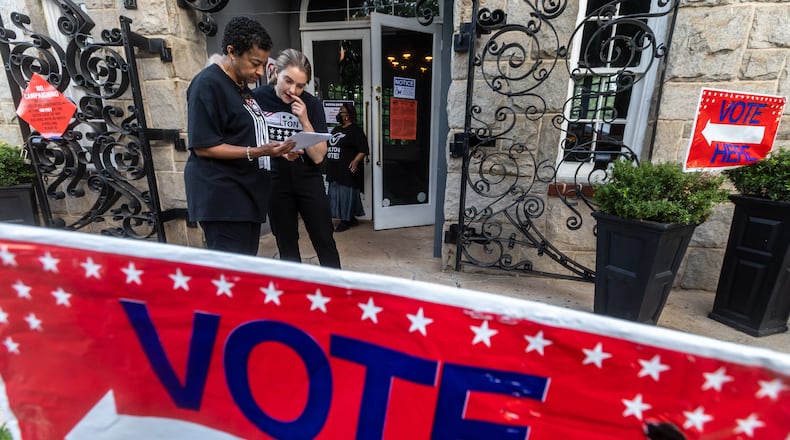The creation of a Georgia website for voters to cancel their registrations this week initially disclosed personal information and quickly led to fears that it could be exploited if wrongdoers attempt to remove legitimate voters.
The secretary of state’s office plugged the data leak and said the site includes safeguards to prevent wrongful voter cancellations while keeping voter lists up to date.
The election-year launch of a voter cancellation website became a flash point among liberal voting rights groups worried that it could be misused, conservatives who want to prevent potential illegal voting, and election security advocates concerned about voting technology.
“The website makes it very easy to challenge anyone’s voter registration status,” said Tamieka Atkins, executive director of ProGeorgia, a left-leaning organization focused on voting access. “It could be anyone behind the computer filling this out. We can hope that it won’t be abused, but I don’t know if it’s smart to put our elections on hope.”
Few cases of illegal out-of-state voting have ever been proved in Georgia.
Credit: File
Credit: File
The website requires voters to provide basic information, such as their name and birth date, along with a driver’s license number or the last four digits of a Social Security number — the same personal information that was briefly available when the website went live Monday.
A programming error displayed the private information through a link to a computer-generated voter cancellation form that was supposed to only be viewable by county election officials, said Gabriel Sterling, chief operating officer for Secretary of State Brad Raffensperger’s office. About 25 people got to the point on the website where they could have seen personal information before the issue was corrected, Sterling said.
“The goal is cleaner voter lists and a more secure way to cancel your registration than through the mail or email,” he said. “It can lower voter registration challenges coming into counties and get rid of issues caused by human errors.”
The site doesn’t automatically cancel voter registrations. Instead, it creates an online way to send cancellation requests to county election offices, where workers are trained to scrutinize voter information before they remove registrations, Sterling said.
Attempts to cancel multiple voters at once would raise a red flag and wouldn’t be processed without verification, Sterling said. Whenever a registration is canceled, county election offices mail a confirmation letter, and voters can re-register if needed or cast a provisional ballot. Election officials could also reinstate voters who were canceled in error, he said.
The secretary of state’s office is examining additional ways to ensure that cancellation requests won’t negatively affect legitimate voters, including the possibility of limiting the website’s usage at times, such as during the weeks before an election, Sterling said.
“We’ve done everything we can to mitigate the risks,” Sterling said. “I know this is a heightened environment, but we have to be willing to move into a digital age. It’s going to make it easier and make our data better.”
The secretary of state’s office tracks the internet addresses of people who use the cancellation website, and fraudulently canceling a voter’s registration is a felony.
Unless voters cancel their registrations themselves after they move, they can stay registered for years because of state and federal laws that require notifications and waiting periods designed to ensure they aren’t wrongly disqualified.
Georgia election officials routinely cancel voters who haven’t participated in recent years, and conservative activists have filed over 100,000 voter eligibility challenges since 2021 seeking the removal of voters who they believe have moved away. Most voter challenges have been rejected by county election boards.
Roughly 300 cancellation requests had been filed through the website as of Thursday, and most of them were for people who had already changed their address with the U.S. Postal Service or were inactive voters who haven’t voted in recent years and likely moved away, Sterling said.
NAACP President and CEO Derrick Johnson said the website should be taken offline because it’s a threat to voter access.
“Make no mistake — this decision is a direct attempt to stifle the voices of Georgia’s most powerful and historically disenfranchised voters,” Johnson said. “The NAACP demands that Secretary Raffensperger immediately reverse this process that is in direct violation of our fundamental right to vote.”
Georgia isn’t the only state with a voter registration cancellation website, according to the secretary of state’s office. States including Colorado and Nevada have similar websites.
Voters can check their registration status and sign up to vote through Georgia’s My Voter Page at www.mvp.sos.ga.gov.
About the Author
Keep Reading
The Latest
Featured




